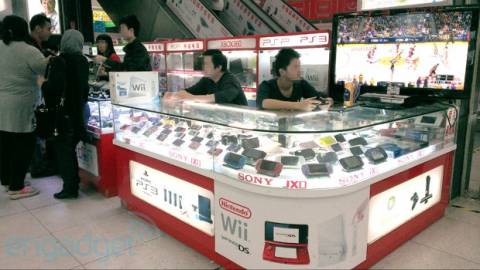The People's Console: How China may define the next generation
By isomeri 6 Comments
In the year 2000 videgame consoles were banned in China. Well banned officially anyway. Consoles have been sold quite openly on the gray markets of China ever since and a healthy dose of piracy has ensured that Chinese customers have had access to all the latest and greatest games which we all enjoy. In fact it is common for shops to sell consoles pre-hacked or offer a hacking service. On top of this the Chinese market is filled with the notorious knockoffs of "real" consoles.

Now however it seems that the Chinese government may finally be lifting the ban and allow the sale of consoles in the country as long as they are manufactured in Shanghai. This move may have huge implications for the struggle of dominance in the console space between Sony, Microsoft and Nintendo. China will soon overtake the United States as the worlds largest economy and with a population of around 1 billion and 340 million people there are a lot of potential customers out there. Now it is obvious that the majority of the Chinese public is still living in an economic situation which doesn't allow them to purchase videogame consoles for entertainment, but the millions upon millions of city dwellers in China already have the required income to play the game.
Now I ain't no expert, but some economics studies with a dose of common sense tell me a few things about what to expect from the next few years. First of all I predict that the current generation of consoles, the 360, PS3 and the Wii will have even longer lifespans than first anticipated if they are introduced to the Chinese market. These reasonably priced consoles with a huge catalog of games should become quite appealing to the lower middle income households of China. Handhelds are also likely to be popular much the same way as they are in Japan because of long public transport commutes. There are millions of potential customers out there for the Xbox One and the PS4.
China has quickly become the most important market for several luxury products such as expensive cars and it's easy to see how powerful gaming machines would appeal to this same relatively young and increasingly wealthy portion of the population. We will most likely also see a lot of competition from new Chinese ventures. I could easily see a company like Huawei try their luck at the business with such a strong brand in their local market. And talking about brands and marketing, Microsoft may have an edge here on Sony and Nintendo. Now I don't want to sound like a jackass here, but Japanese companies have got a very real problem in the Chinese market because of past and present geopolitical and racial disputes. Without much marketing effort at all, Microsoft could easily pull a lead over Sony in the Chinese market because of this despite the higher price of their hardware.
Piracy will likely continue to be a real problem for videogame companies in the country, and I honestly don't know how they will address it. Selling their consoles in China is an obvious profit deal, but if they can't make any money on software it may not be appealing for publishers to do the translation work into Chinese that they would need to penetrate the market. At this point Microsoft may be really regretting pulling a 180 on their DRM policy, since online gaming is ridiculously popular in China and with an online DRM system they could have had a pretty big stick to wave against the software thieves. Although I guess eventually no victory can be gained over hardware hackers.
And you can't have a Chinese videogames market without some Chinese videogames. It would be really refreshing to see games built through the lense of a new cultural angle and hopefully some brand new ideas. Hopefully this opening of the Chinese market will let developers build more ambitious games for a wider audience and increase the competition between the big three. In the end we will probably need to start caring about China, even though China don't care about us.
